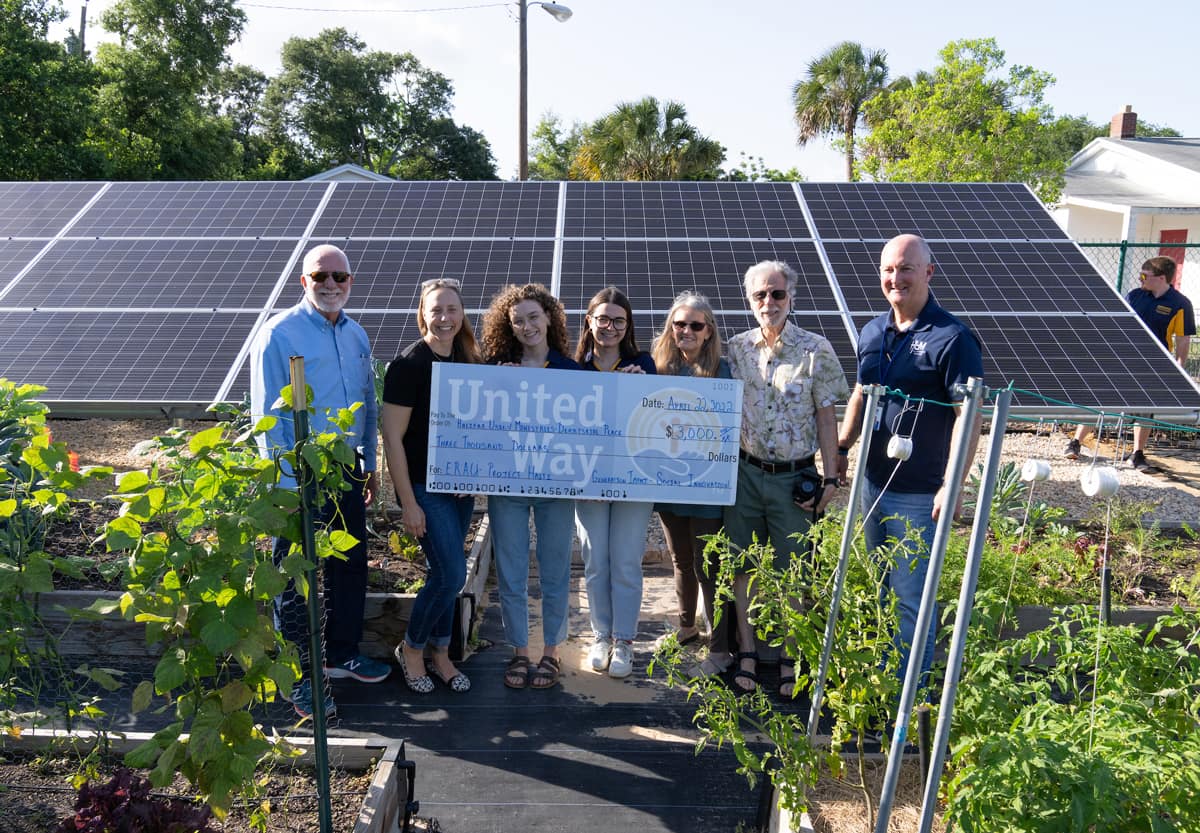Eagles Install Solar Panels at Community Garden

On Earth Day, April 22, Embry-Riddle Aeronautical University students finished installing 18 solar panels at the community garden at Derbyshire Place to reduce electricity costs at the facility, which provides much-needed food, education and outreach programs to residents of the north Daytona Beach, Florida, area.
With generous support from a Ford Foundation Campus Community Challenge grant as well as the United Way Social Innovation Fund, local philanthropists Andrea and Larry Frank, and Halifax Urban Ministries, the solar panel installation grew out of two Embry-Riddle initiatives – Project Haiti and the Honors Program.
The new solar panels “should help cut the center’s electrical bill by about $1,000 per year,” Embry-Riddle student Marcella Smith said. Those savings could allow Derbyshire Place, which runs the garden, to serve up to 60 more meals per month to people in need, said Smith, who serves as president of Project Haiti, which is supervised by Dr. Marc Compere, associate professor, Mechanical Engineering.
“The system of solar panels generates up to 16.9 kilowatts of power,” added student Cassidy Searles. “More importantly, this technology will help provide more meals for our community.”
The solar panel installation supports and complements the sustainable (regenerative) agricultural practices put in place by the Honors Program community garden partnership, said Dr. Geoffrey Kain, Honors Program director and professor, Humanities and Communication. That concept is especially important at a facility like Derbyshire Place, which is located in an urban food desert.
“The generous addition of this beautiful solar array will not only support Derbyshire Place, but should attract more attention to the garden space itself and draw in even more community members and school groups,” he said.
Kain said that students like Grace Robertson, who coordinated Honors Program student participation at the garden, routinely showed up at 8 a.m. on Saturdays and throughout the week over the past two years to continue developing and expanding the community garden. A farmer’s market, operated by the Honors Program, takes place every Saturday.
Showing Their Support
On hand for the Earth Day celebration, Halifax Urban Ministries Executive Director Buck James said the Embry-Riddle project is important because neighborhoods surrounding Derbyshire Place have limited resources and no fresh produce in nearby stores. The garden’s produce, sold at the weekly farmer’s market, also benefits Hope Place, a nonprofit dedicated to helping displaced families with children and young adults who have aged out of foster care, James noted.
Another Earth Day celebrant, project supporter Andrea Frank, who was joined by her husband Larry, expressed joy as she surveyed the student-packed garden. “Just look at how high that kale is growing,” she said. “And I’ve never seen that many tomatoes on one plant. These students are doing a great job.”
The United Way of Volusia-Flagler Counties’ Generation Impact group presented students with a $3,000 grant earlier this year and showed their support during a ribbon-cutting ceremony where the solar panels were unveiled. Representing the United Way at the event were David N. Jones, vice president of the Community Foundation; Amanda Lasecki, local United Way vice president of operations; and Randolyn Haley, vice chair of Generation Impact, United Way of Volusia-Flagler Counties’ Young Professional Group.
“Randolyn and her team held a Social Innovation Fund Pitch Competition where Project Haiti was selected to receive funding,” Lasecki explained. “The Generation Impact members mentor high school and college students and assist them in preparing grant applications, budgets and a presentation to `pitch’ their innovation.”
Originally, Project Haiti had been awarded grant funding from the Ford C3 Foundation to build and deliver a water-filtration system in Haiti, as Embry-Riddle students had done in prior years. Unfortunately, the Covid-19 pandemic and related travel restrictions made that goal impossible.
With permission from the foundation, Embry-Riddle instead developed plans to support the community garden at Derbyshire Place. In addition, Prof. Kain reported, half of the Ford C3 Foundation funding was used by Project Haiti students to design and construct a solar-powered water purifier to be shipped to a malnutrition center in Haiti.
For additional information on this project, read the original story here.

 Ginger Pinholster
Ginger Pinholster